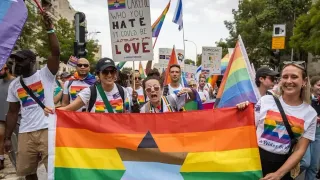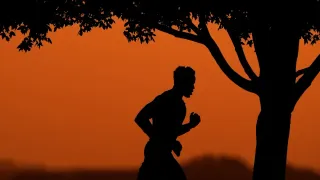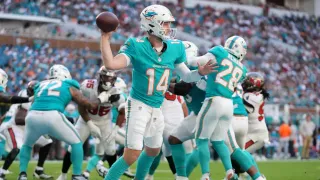Jun 28
Hungary's LGBTQ+ Community Defies Government Ban on Pride March
Justin Spike READ TIME: 3 MIN.
Hungary's LGBTQ+ community is preparing for a face-off with the country's autocratic government, and plans to push ahead with a march in the capital on Saturday despite a government ban and threats of legal repercussions.
The populist party of Prime Minister Viktor Orbán in March fast-tracked a law through parliament that made it an offense to hold or attend events that "depict or promote" homosexuality to minors aged under 18. Orbán earlier made clear that Budapest Pride – marking its 30th anniversary this year – was the explicit target of the law.
But on Friday, Pride organizers along with Budapest Mayor Gergely Karácsony, European Commissioner Hadja Lahbib and Vice President of the European Parliament Nicolae Stefanuta said the march will take place Saturday despite official threats of heavy fines for participants and even jail time for the liberal mayor.
They expect the march to be the largest ever Pride event in Hungary.
"The government is always fighting against an enemy against which they have to protect Hungarian people ... This time, it is sexual minorities that are the target," Karácsony told a news conference. "We believe there should be no first and second class citizens, so we decided to stand by this event."
A crackdown on LGBTQ+ rights
Critics of the Pride ban and other Hungarian legislation targeting LGBTQ+ communities say the policies are reminiscent of similar restrictions against sexual minorities in Russia.
Hungary's recent law allows authorities to use facial recognition tools to identify individuals that attend a prohibited event. Being caught could result in fines of up to 200,000 Hungarian forints ($586.)
Orbán, seen as Russian President Vladimir Putin's closest ally in the European Union, has in recent years prohibited same-sex adoption and banned any LGBTQ+ content including in television, films, advertisements and literature that is available to minors.
His government argues exposure to such content negatively affects children's development. But opponents say the moves are part of a broader effort to scapegoat sexual minorities and consolidate his conservative base.
Fines and facial recognition
After police rejected several requests by organizers to register the Pride march, citing the recent law, Karácsony joined with organizers and declared it would be held as a separate municipal event – something he said does not require police approval.
But Hungary's government has remained firm, insisting that holding the Pride march, even if it is sponsored by the city, would be unlawful. In a video on Facebook this week, Hungary's justice minister, Bence Tuzson, warned Karácsony that organizing Pride or encouraging people to attend is punishable by up to a year in prison.
At the news conference Friday, Karácsony sought to dispel fears that police would impose heavy fines on Pride attendees.
"Police have only one task tomorrow: to guarantee the safety and security of those gathered at the event," he said.
Speaking to state radio on Friday, Orbán said that attending Pride "will have legal consequences, but it can't reach the level of physical abuse."
"The police could disperse such events, they have the right to do so. But Hungary is a civilized country," he said.
Right-wing counter-demonstrations
On Thursday, radical right-wing party Our Homeland Movement announced it had requested police approval to hold assemblies at numerous locations across the city, many of them on the same route as the Pride march.
Later, a neo-Nazi group said it too would gather Saturday at Budapest City Hall, from which the Pride march is set to depart. The group declared that only "white, Christian, heterosexual men and women" were welcome to attend its demonstration.
European officials respond
Hungary's Pride ban has prompted a backlash from many of the country's partners and allies. Over 30 foreign embassies signed a joint statement this week expressing their commitment to "every person's rights to equal treatment and nondiscrimination, freedom of expression and peaceful assembly."
European Commission President Ursula von der Leyen posted on social platform X on Wednesday, calling on Hungarian authorities to allow Pride to proceed "without fear of any criminal or administrative sanctions against the organizers or participants."
More than 70 members of the European Parliament, as well as other officials from countries around Europe, are expected to participate in Saturday's march.
Lahbib, the European Commissioner, said Friday that "all eyes are on Budapest" as Pride marchers defy the government's ban.
"The EU is not neutral on hate," she said. "We cannot stay passive. We cannot tolerate what is intolerable."






